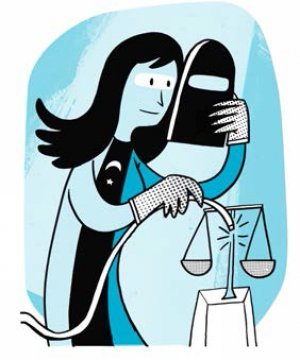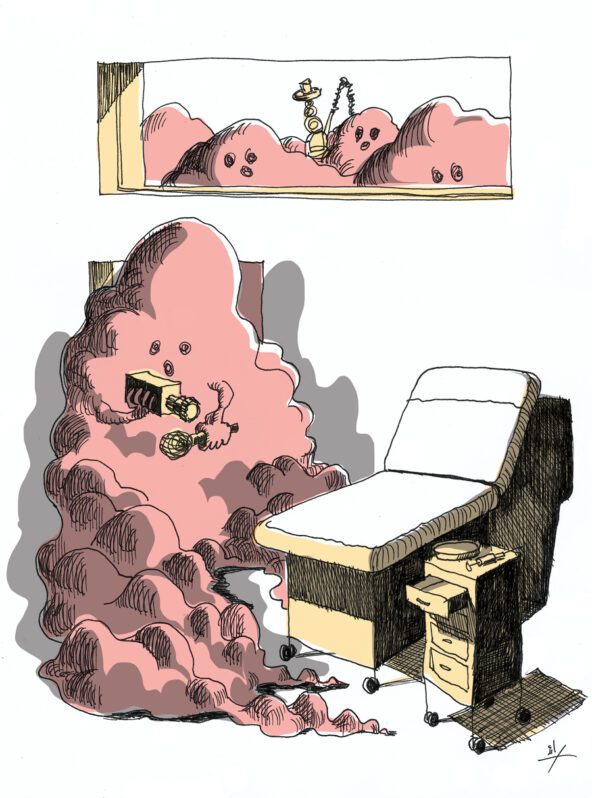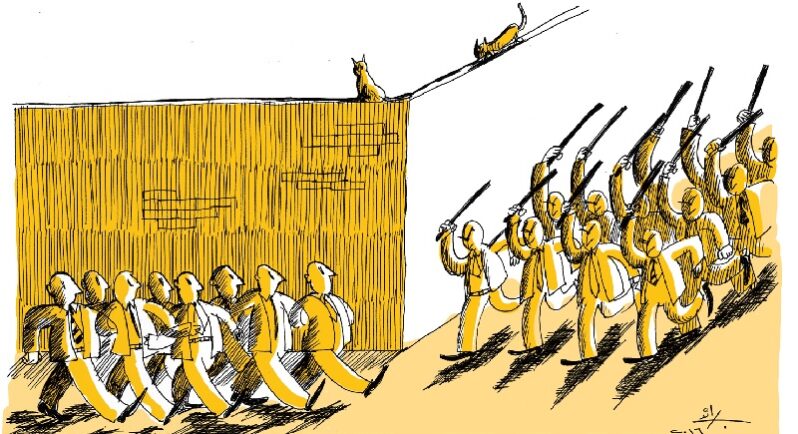Women’s Rights in Libya: Preserving Past Gains, Fearing for the Future

Multiple social restrictions constrain the freedom of women in Libya, preventing them from exercising the rights they have been granted. It is only fair to point out that under the former regime, Libyan women were able to overcome many of the restrictions that impeded their activities and advancement. Compared to many Arab states, Libyan women were the subject of considerable legal consideration under the previous legal system.
Legal and Constitutional Reforms Under the Gaddafi Regime
Legislation passed [under the Gaddafi regime] aimed to support and promote women’s rights, beginning with Law 10 of 1984 concerning marriage and divorce. It treated women equitably, granting them all of the rights given to them under [Islamic] law––while adding other privileges, including the right to child custody within the marital home. The law was noteworthy not only because it addressed most of the issues arising from the thorny implications of marriage and divorce, but because it also specified that in the absence of a text [on a particular issue], the principles of Islamic law conforming most closely to the spirit of the [Libyan] law should be applied. This granted the judge the opportunity to exercise ijtihad (judicial interpretation) for the sake of promoting women’s rights.
The following year, Law 16 of 1985 concerning the basic pension, was issued. This required the state to support widows and divorcees, and decreed that widows unable to find an adequate source of income would be guaranteed a decent living (Articles 7-12). In addition, Law 12 of 2010 on labor affirmed that all citizens, males and females, had the right to work (Articles 2, 24, and 25). It specified that women should work in jobs suited to their nature, and forbade discrimination against them; although, it did include positive discrimination to their benefit by specifying three months of fully paid maternity leave. The law also declared the principle of pay equality between men and women.
It is no secret that the former regime wished to use these laws to send a political message to the world, presenting itself as advanced and civilized. This is clear from the fact that it violated other rights and restricted public freedoms even as it was issuing these laws. But whatever the justification for adopting them, their principal consequence was the existence of numerous laws protecting women’s rights. The culmination of this trend, from which there was no turning back, was the ratification of the Convention on the Elimination of All Forms of Discrimination against Women (CEDAW) in 1989. The ratification of this Convention had an immediate effect in a law allowing women to apply for positions in the judiciary, which had previously been restricted to men.[1]
Basic Law 20 of 1991 reinforced and consolidated this trend. As Libya had no constitution at the time, it was tantamount to a constitutional declaration. The law aimed to promote liberty, and its 38 articles emphasized equality between men and women. Its first article stated, “The citizens of the Great Jamahiriya, male and female, are free and enjoy equal rights, which are inalienable”. Articles 2 and 3 affirmed that women (as well as men) have the right to exercise authority and may not be denied the right to defend the motherland. Of course, it must be pointed out that some sections of this law were no more than ink on paper, particularly those that expanded the freedoms of expression, thought, and creativity.
Overall, however, this Basic Law focused on promoting and enhancing the rights and liberties that had been granted to women, including those that already existed in lower legislation. Articles 25-28 confirmed a woman’s right to marry at her own will and without compulsion, as well as her right to custody and the impermissibility of depriving a mother of her children. The law did not stop there, however, granting a woman in custody of her children the right to the marital home. Allowing women to remain in the marital home, even after a marital relationship has ended –for long as she is has custody of the children– is one of the law’s most distinguishing features. It also affirms women’s labor, with the condition that a woman’s work should be appropriate for her, and forbidding her to be employed in work that “does not suit her nature”.
Many subsequent laws followed along the same lines in various issues (political, employment, economic, social), all conforming with the notion of non-discrimination on the basis of sex. If one closely analyzes the trends in Libyan legislation at the time –outside of their political contexts– it is clear that its goals rested on two central issues: first, dispelling injustices and abuses long suffered by women, and second, invoking what is termed “women’s biological nature”, especially in terms of determining what was required to create suitable or appropriate conditions for them.
Women’s Rights in Libya After the Revolution
Women actively participated in the February 17, 2011 Revolution. Afterwards, they (like many others) were optimistic given its slogans, which called for establishing the rule of law and institutions and respecting rights and public freedoms, as well as civil liberties. However, as soon as the armed conflict ended and Gaddafi was killed, Mustafa Abdul Jalil became the head of the new ruling government.[2] Around that time, on October 23, 2011, he famously stated that it was a man’s right, by law, to marry more than one woman; he was criticizing the way that previous legislation had restricted this right to limited and specific circumstances.[2]
The former regime had put specific conditions in place for polygyny to be acceptable, in accordance with the Quran, which indicates that it is only permissible if the husband can act justly towards all his wives.[3] Yet [Abdul Jalil’s] rhetoric was confirmed by the judiciary in 2013, when the Libyan Supreme Court ruled that the law addressing a man’s right to a second marriage was unconstitutional, on the premise that it violated Islamic law.[4] Eventually, this made its way into a new law, issued in 2015 by the outgoing legislature in Tripoli, nullifying the conditions that had been put in place for permitting polygyny.[5]
Matters did not stop at polygyny, however: within the new government of Libya, a different approach to women has begun to surface. It can be seen, for example, in the legal approach to those whom the government has elevated: revolutionaries and militants who fought for the revolution with blood, honor, and money. In the case of men, the legislature recognized these sacrifices with gratitude, compensation, and rehabilitation.[6] Female revolutionaries, however, have been ignored – except for those who had been subjected to sexual abuse.
The executive power presented the General National Congress with a draft law addressing the situation of women who had been raped or battered during the ‘War of Liberation’. Yet the legislature evinced a clear tendency towards denying such violations, and as a result, they rejected the law. They did so on the basis that it conflicted with society’s values and with Libyans’ true religion, which demanded that such incidents be covered up. Some members claimed that enacting the law would open the door to delinquent women who might claim that they were raped because of their opposition to the previous regime. In 2014, the government responded by adopting a law in the form of a decree on the issue.[7]
In the same vein, one can see the negative trend when it comes to Libyan women’s legal gains. For example, Law 14 of 2015, issued by the General National Congress, amended Article 14 of Law 10 of 1984, cancelling a woman’s ability to witness a marriage contract.[8] The law regulating marriage and divorce had previously stipulated that a marriage was sound if it had been witnessed by a man and two women.[9] The right of women to apply for positions in the judiciary was also threatened when a lawsuit was filed questioning the constitutionality of the law, specifically the constitutionality of women assuming judicial office.[10][11][12] The response to this lawsuit is anticipated, although it has been so far delayed – which has raised questions, given that appeals were submitted some years ago.
As for the anticipated Constitution, after the active participation of women in the election of the constituent body drafting the Constitution, hopes were high that women’s rights would be enshrined in the Constitution. But the initial outcome of the drafting body, issued in December 2014 was disappointing. For example, it had chosen to use a word with a negative connotation in Libyan society, “spinsters”, to refer to unmarried, single women. The work of the Committee of Twelve, which was charged with creating the final draft of the Constitution in October 2015, was no better. Article 117 did indicate that women are the sisters of men, requiring the state to care for them, to put an end to the negative culture against them, to protect them from all forms of violence, and to provide them with work opportunities.
However, it also included numerous instances of discrimination: it stipulated that a Libyan is the child of a Libyan father, thereby depriving a woman of her right to pass on her nationality to her children.[13] The draft also did not adopt positive discrimination in the form of a “quota” system for electoral procedures. This was a setback given women’s previous legal gains in the political field. After the revolution, for example, Law 4 of 2012 on the election of the General National Congress had included an article requiring [gender] parity in electoral lists.[14]
In conclusion, it is clear that the women of Libya face major challenges that threaten their previous gains and limit the elevation of their status. To confront this trend, women must unite their ranks and create campaigns to advocate for their issues, in particular, in connection to the draft Constitution, which has yet to be put to a referendum.
This article is an edited translation from Arabic.
__________
[1] Law 8 of 1989 concerning the right of women to apply for positions in the judiciary.
[2] Chairman of the National Transitional Council, the authority entrusted with governing the country in the first year following the revolution.
[3] From Surah an-Nisā’ (The Women), 4:3. “And if you fear that you will not deal justly with the orphan girls, then marry those that please you of [other] women, two or three or four. But if you fear that you will not be just, then [marry only] one or those your right hand possesses. That is more suitable that you may not incline [to injustice].” (Sahih International translation)
[4] Ruling of the Libyan Supreme Court’s Constitutional Chamber, regarding Constitutional Appeal No. 3 of 2013, on the unconstitutionality of Article 13 of Law 10 of 1984, and modifying Article 1 of Law 9 of 1994.
[5] Law 14 of 2015, which addressed amending Articles of Law 10 of 1984 on marriage and divorce, and canceling Article 13 of that law.
[6] This was accomplished through a set of laws, including Law 4 of 2013 concerning provisions related to permanently disabled veterans of the War of Liberation; Cabinet Decree 85 of 2012 regarding caring for and honoring the families of martyrs and missing persons, March 3, 2012; and, Law 50 concerning compensation of political prisoners, issued June 11, 2012.
[7] Decree 119 of 2014 concerning victims of sexual violence. Even the new Libyan legislature, the House of Representatives, did not adopt it.
[8] Issued on October 14, 2015, by the outgoing General National Congress.
[9] Law 10 of 1984, published in the Official Gazette on June 3, 1984.
[10] Constitutional Appeal No. 60/10 in 2012 and 14/60 on June 9, 2013.
[11] Specifically, stating that it violated the first article of the 2011 Constitutional Amendment, which made Islamic Law a principal source of legislation.
[12] Law 8 of 1989, which stipulated in its first article that “A woman may assume judicial posts, as well as the posts with the Public Prosecution and Administration of Justice under the same terms as for men”.
[13] Article 11 of the document created by the task force (Committee of Twelve) of the constituent body for drafting the Constitution.
[14] The article stipulated that candidate lists should be arranged alternating male and female, vertically and horizontally, and that no list would be accepted unless it conformed to this principle.



